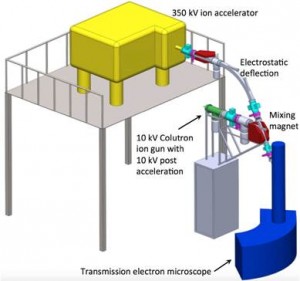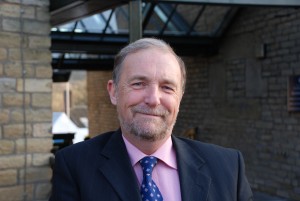A multi-million pound award will enable the construction of an advanced new facility at the University of Huddersfield. The centre for the investigation and development of nuclear materials will ensure the safety of the new generation of reactors to be built in the UK and internationally. It also means that scientists at the University will continue to play an important part in the development of space technology.
The Engineering and Physical Sciences Research Council (EPSRC) has announced a grant of £3.5 million to the research group headed by the University of Huddersfield’s Professor Stephen Donnelly who developed the existing facility named MIAMI – standing for Microscope and Ion Accelerator for Materials Investigations.
Unique in the UK, and one of only two such facilities in Europe, it is a combined electron microscope and ion beam accelerator. It uses ion bombardment as a safe, non-radioactive means of simulating the effects of radiation damage on materials.
MIAMI-2
MIAMI is well established – especially as a tool for researching the materials that are best for withstanding irradiation in nuclear reactors. But now Professor Donnelly and his team have won the funding to construct MIAMI-2 opening up even greater research possibilities.
It will be an advanced electron microscope interfaced with dual ion-beams, meaning that it can simultaneously simulate two key aspects of neutron bombardment: the damage on the atomic structure of materials and the internal changes caused by the build-up of gases – principally helium and hydrogen. This accumulation of gas bubbles can severely weaken materials by creating a “honeycomb” effect.
“With our existing MIAMI, we can investigate these two issues sequentially,” explained Professor Donnelly. “But that isn’t the same as what neutrons are doing simultaneously. So MIAMI-2, with its second beam line, will mean that we are more completely simulating the conditions in nuclear reactors.”
“The new machine will also be much more versatile than the original MIAMI facility and have enhanced analytical capabilities,” continued Professor Donnelly, who anticipates that MIAMI-2 will lead to an even greater number of research collaborations with scientists from around the world.

Space age
Nuclear science is likely to continue as the main area of investigation, but other fields of interest will continue to be developed, including nanotechnology and space research.
“Any vehicle, or anything sent anywhere into space – whether into earth orbit or interstellar space – is being bombarded by energetic particles. So there are significant applications for MIAMI-2 in that area,” said Professor Donnelly.
The existing MIAMI facility will continue to be used for research and also for training purposes, but MIAMI-2 will be constructed in Spring 2016 and be fully operational soon after that. The award of £3.5 million is to pay for the manufacture of the equipment and the grant application was ranked second out of more than 180 that were considered by an EPSRC panel.
Professor Donnelly and his team have consolidated their leading position in nuclear materials and nanomaterial research by winning a succession of EPSRC awards, including recent grants of £1 million and £400,000 which have led to the appointment of three new Research Fellows at the University.

Spotlight
Professor Stephen Donnelly
Professor Stephen Donnelly heads up the Electron Microscopy and Materials Analysis (EMMA) Research Group and developed the existing MIAMI facility. Stephen’s main research interests include the interaction of energetic particles with matter, defects in solids, electron microscopy, nanotechnology and ion beam technology. He regularly collaborates with scientists from across the world, including Australia, Brazil, Finland, France, Japan, Russia, Ukraine and the USA, including major national laboratories, Argonne National Laboratory in the USA and the National Institute for Materials Science in Japan. To find out more about the research in this article please contact: Professor Stephen Donnelly, Dean, School of Computing and Engineering, email: s.e.donnelly@hud.ac.uk
Autumn 2015 Issue
Return to the home page for the Autumn 2015 Issue of Discover.
Next article
Challenging conceptions of young people on the margins of education and work.
